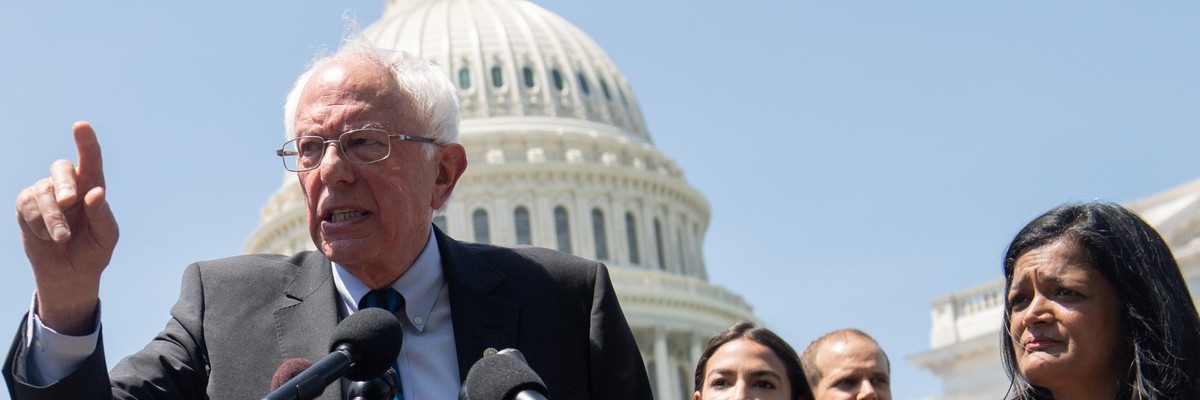Amid ongoing negotiations over federal infrastructure legislation, progressive lawmakers and advocates on Monday reiterated their commitment to a popular policy that could help pay for a sweeping package: taxing the rich.
"Taxing the rich isn't about discouraging wealth, it's about making sure the wealthiest Americans play by the same rules as the rest of us."
--Tax March
"64% of Americans agree that it's time to raise taxes on the ultra-wealthy. Let's do what the people want and tax the rich," Rep. Pramila Jayapal (D-Wash.), chair of the Congressional Progressive Caucus, tweeted Monday.
A Reuters/Ipsos poll found last year that 64% of American adults strongly or somewhat agree "the very rich should contribute an extra share of their total wealth each year to support public programs," a finding echoed by other recent surveys.
In April, Morning Consult revealed that 65% of voters somewhat or strongly support funding President Joe Biden's infrastructure package by increasing taxes on corporations.
Jayapal also shared a Sunday New York Timesreport about bipartisan infrastructure talks colliding with Democrats' goal to tax the rich--which quoted key lawmakers including Senate Finance Committee Chair Ron Wyden (D-Ore.), Senate Budget Committee Chair Bernie Sanders (I-Vt.), Sen. Elizabeth Warren (D-Mass.), and Rep. Alexandria Ocasio-Cortez (D-N.Y.).
While the centrists behind the bipartisan proposal have avoided tax increases for the wealthy and GOP lawmakers won't support undoing the tax cuts for high-income individuals and corporations they forced through under then-President Donald Trump in 2017, progressives are making clear that raising taxes on the rich is a crucial moral and policy priority.
"What we're doing is generating revenue, but we are also making a major area of American government more fair, so people don't feel they've been played while the rich person gets off scot-free," Wyden--whose tax-writing committee has spent weeks drafting policy changes aimed at companies, the energy industry, and individuals--told the Times.
"There's been a big change in voter attitudes on taxes," he added. "Now, the American people are sympathetic with our point, which is that everybody ought to pay their fair share."
Frank Clemente, executive director of Americans for Tax Fairness, said Monday that Wyden "is right" that tax reforms under the current administration are fundamentally about making taxation more fair.
Tax March also highlighted the Times report, tweeting that "Taxing the rich isn't about discouraging wealth, it's about making sure the wealthiest Americans play by the same rules as the rest of us."
Progressive lawmakers are emphasizing that message--particularly Sanders, who is working on legislation that would address "human infrastructure," which could pass through the budget reconciliation process that avoids the filibuster.
"We have learned recently that some of the wealthiest billionaires in this country don't pay a nickel in a given year in federal taxes," said Sanders, referencing a recent ProPublicareport. "You've got dozens of corporations that are going to make billions in profits and not pay a nickel in taxes."
"It is obvious that if we're going to address the needs of working families in this country, we need revenue," he told the Times, "and one way that we get that revenue is by demanding that the wealthiest people, the largest corporations are paying their fair share."
Appearing on "Meet the Press" Sunday, Sanders expressed concern that the bipartisan proposal--focused on physical infrastructure like bridges and roads--may rely on raising a gas tax.
Like Sanders, Rep. Ro Khanna (D-Calif.) said on CNN that he is "open to doing two separate bills" on infrastructure but would not support taxes on gas or electric vehicles.
Predicting that such taxes also won't be supported by Biden or U.S. House Speaker Nancy Pelosi (D-Calif.), Khanna said, "I don't think people look at what's going on in this country and say, 'You know what we really ought to do is punish people at the pumps and and punish the working class.'"
White House Press Secretary Jen Psaki reiterated the president's opposition to a gas tax on "CBS This Morning," saying Monday that "we're just not going to stand for that and we're not going to accept that."
However, Psaki also suggested that Biden may ultimately support the bipartisan proposal--perhaps alongside legislation focused on the care economy and the climate emergency that could be passed through the reconciliation process, which requires only a simple majority of Senate Democrats.
"We need a few more details about the deal and about the proposal, including specifics about how to pay for it," she said of the bipartisan plan. "It is a positive sign though that Democrats and Republicans are continuing to negotiate. The president looks forward to getting more details. He'll probably be talking to, welcoming members to the White House over the next couple of days, and we'll go from there."
While the White House and some Democrats in Congress have signaled a willingness to possibly pass two bills rather than a singular, sweeping package, the approach makes some progressives nervous--especially considering that a reconciliation bill requires support from centrists such as Sens. Joe Manchin (D-W.Va.) and Kyrsten Sinema (D-Ariz.).
Ocasio-Cortez told the Times there are "absolutely" concerns that if centrists get a smaller bipartisan bill approved, they won't back a reconciliation bill.
"It was at the insistence of the more conservative Democrats that we had to include how we were going to pay for the infrastructure spending," she said. "So this comes to the White House, the White House agrees, comes back and says, 'OK, we're going to tax the rich,' and then the same conservative wing that demanded, 'How are we going to pay for it?' is now saying, 'Wait, wait, wait--not like that.'"

